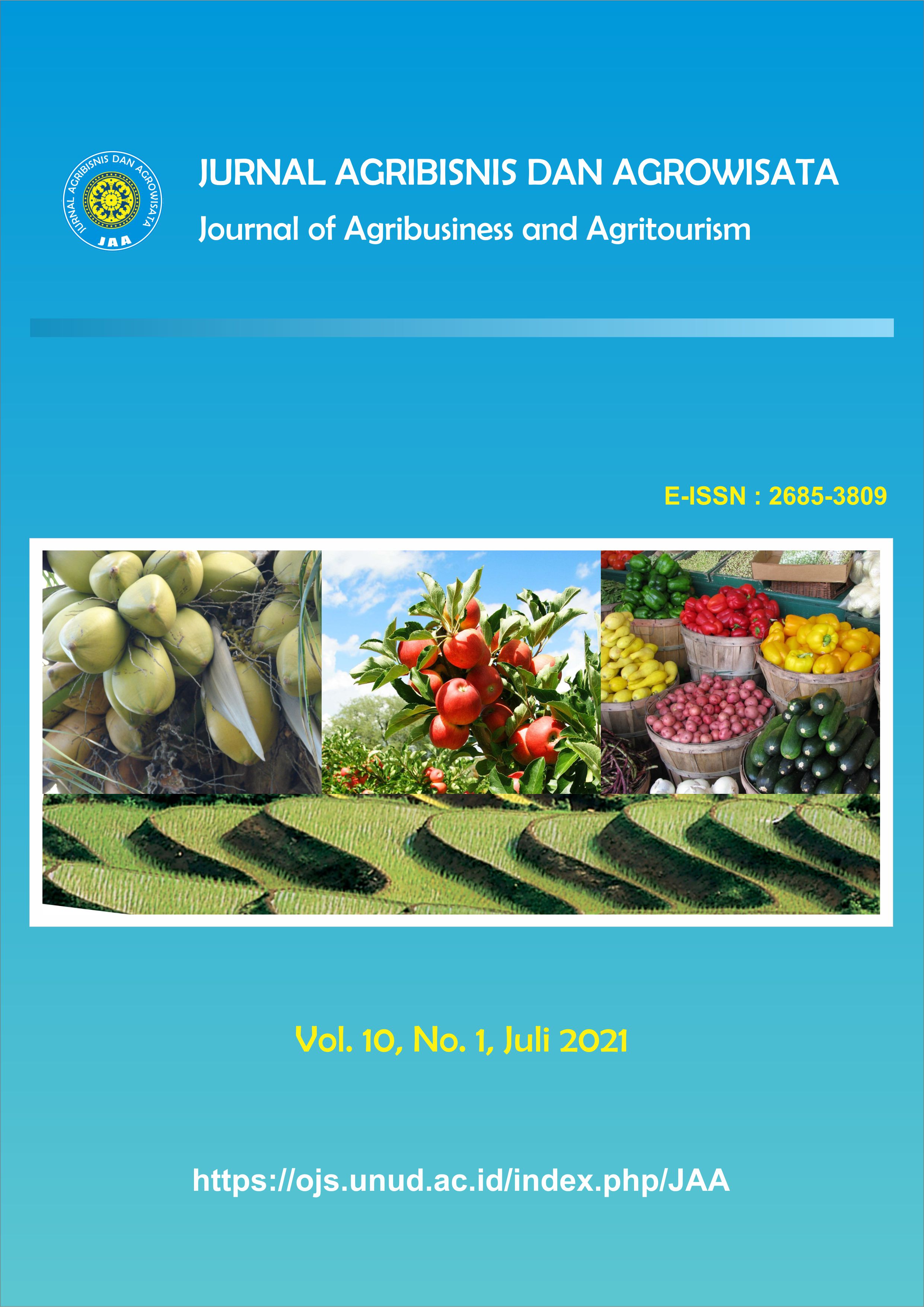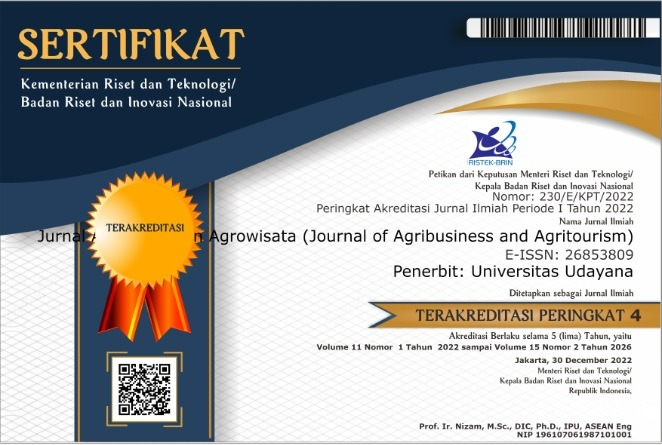Saluran Pemasaran Labu Siam pada Kelompok Tani Setia Makmur di Desa Antapan, Kecamatan Baturiti, Kabupaten Tabanan
Abstract
Pumpkin Marketing Channel Saluran at the Setia Makmur Farmer's Group inAntapan Village, Baturiti District, Tabanan Regency
Increased production results without the support of good marketing channels will cause obstacles to producers (farmers) so the chayote farmers in the village of Antapan form a farmer group. The Setia Makmur Farmer Group in Antapan Village markets its products in several marketing institutions that finally reach the end consumer. To be able to find out which marketing channels provide the best benefits for this farmer group, it is necessary to conduct research on the marketing channels of chayote applied by the Setia Makmur Farmer Group, Antapan Village, Baturiti Sub-District, Tabanan Regency. The purpose of this research is to find out the pattern of chayote marketing channels and how much profit, costs, and marketing margins of the Farmers Group of SetiaMakmur. The method used for determining the sample in this study is the snowball sampling method. The results showed that the chayote marketing channel pattern in the Setia Makmur Farmer Group consisted of three patterns, consisting of (I) farmers - collectors / middlemen - retailers - consumers, (II) farmers - retailers - consumers and (III) farmers - consumers. The pattern of the first marketing channel shows that the costs, profits and margins of the collectors / middlemen for class A chayote is the most profitable because of its best quality compared to class B and C chayote, then the cost of a class A chayote is Rp. 13,160, profit is Rp 3,040 and margin of IDR 25,400. The second marketing channel pattern, namely costs, profits and margins for retailers for class A costs Rp 4,500, profits Rp 1,900, margins Rp 6,400 where in the second channel pattern, retailers sell directly to consumers. The pattern of the third marketing channel does not cost anything because the farmer sells them directly to consumers without an intermediary institution, this shows that the margin on the third marketing channel is zero.
Downloads
References
Darmawati. 2005. Analisis Pemasaran Mendung di Kabupaten Bentul. Sripsi S1 Program Studi Sosial Ekonomi Pertanian/ Agrobisnis Fakultas Pertanian Universitas Sebelas Maret Surakarta.
Erningsih, N.L.P. 2007. Saluran Pemasaran Komoditi Semangka (Cirullus Vulgaris, Schard) di Subak Ceti dan Subak Selukat, Kabupaten Gianyar. Sekripsi S1 Agribisnis Fakutas Pertanian Universitas Udayana. Denpasar.
Rahdi, F., Rony, P. dan Asiansi, B., 2001. Agribisnis Tanaman Sayur. Jakarta: Penebar Swadaya.
Rahim dan Hastuti . 2007. Ekonomitrika Pertanian Pengantar, Teori, dan Kasus. Penebar Swadaya. Jakarta.
Saade, Rafeal Lira. Chayotte (Sechium Edule).1996. International Plant Genetic Intitute
Soekartawi. 2002. Prinsip Dasar Manajemen Pemasaran Hasil-Hasil Pertanian Teori dan Aplikasinya. Jakarta: Raja Grafindo Persada
Sudiyono, A. 2002. Pemasaran Pertanian. UMM Press. Malang
Suharyanto, Ida Ayu Putu Parwati dan Jemmy Rinaldi. 2005. Analisis Pemasaran dan Tataniaga Anggur di Bali. Jurnal Sosial Ekonomi Pertanian dan Agribisnis (SOCA), Volume 8 Nomor 1, Februari 2008. Denpasar
Zulkamain. 2010. Dasar-dasar Hortikultura. Jakarta: PT Bumi Aksara.







